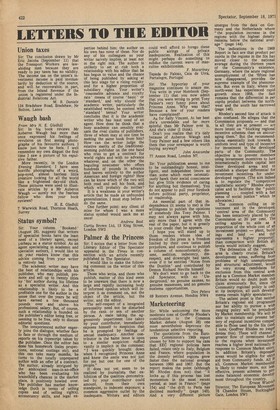Marketeering
Sir: While welcoming the more moderate tone of Geoffrey Rhodes's contribution to the Common Market debate (August 28) one must nevertheless deprecate the tendentious selective reporting.
The quotations from the European Commission's 1969 report chosen by him to support his case that EEC regional policies have failed, relate only to Italy, Belgium and France, where population in the densely settled regions grew faster than the national average between 1960 and 1967. But the report makes the point (although Mr Rhodes does not) that "it Jocks as if this process has lost momentum in the most recent period, at least in France" (page 154) and "the drift to Paris has declined markedly" (page 143). And a very different picture emerges from the data on Germany and the Netherlands where "the population increase in the regions with the highest density remains below the national average" (page 144).
The indications in the 1969 Report in fact are that product per capita in the regions in the Six has moved closer to the national average during the thirteen years of the Community's existence. Germany, where the acute regional unemployment of the 'fifties has now disappeared, provides the supreme example of the phenome non. But even in Italy, where the north-west has experienced rapid growth since 1958, the fact remains that the differential in per capita product between the northwest and the south has narrowed (page 146).
Rhodes's second line of attack is also confused. He alleges that the Commission proposals — and that is all they are at present — are more intent on "blocking regional Incentive schemes than on encouraging them." But the recommendations essentially look towards a uniform level and type of incentive for investment in the developed parts of the Community. The objective is to prevent members using investment incentives to lure internationally mobile capital into these developed areas and to establish a sharper differential for investment incentives for underdeveloped regions. (The aim indeed is to regulate the "competitive capitalistic society " Rhodes deprecates and to facilitate the "public planning . . . coupled with a fair sense of social justice" which he advocates.) The common ceiling on investment aid in the developed, 'central area of the Community has been tentatively placed by the Commission at 20 per cent. The ceiling applies to aids as 8 proportion of the whole cost of an investment project — plant, buildings and land — and thi`, represents a higher proporti(,,, than comparison with British al+. levels would initially suggest. The delineation of the 'central area is clearly crucial. Britain'8 development areas, suffering front problems of high unemployment and structural adjustment, would be very strong candidates for exclusion from this central area, and as a Common Market member, Britain would no doubt push this claim strenuously. But, since the Community regional policy is onlY at its inception, all such develop' ments remain highly speculative. The salient point is that neither Britain's regional aid programme nor her ability to pursue a wide ranging policy will be prejudiced by Market membership. We will be able to maintain our present battery of regional incentives compar; able to those used by the Six (and, I note, Geoffrey Rhodes no longer denies this). These will channel greater flow of investment NO to the regions when investment reaches a higher level nationally In response to Common Market entrY; In addition Britain's depresS0 areas would be eligible for extril aid from Community funds. All !II all, Common Market memberstur Is likely to render more, not 105, effective, present schemes to poll mote balanced economic develoP ment throughout the country. , Ernest Wistricil Director, The European Movement' 78 Chandos House, Buckinghrun Gate. London SWI


































 Previous page
Previous page